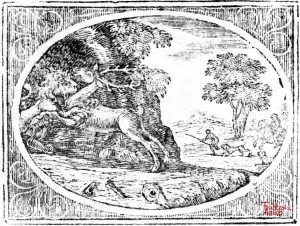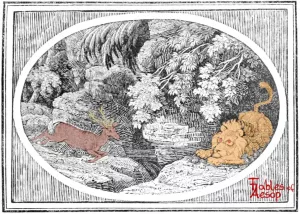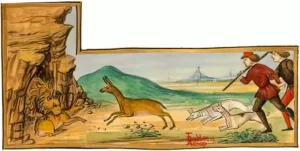A deer being chased tries to hide in a cave with a lion in it. Bad move. Bye, bye deer.
Everything, including death, can be done easy or hard.

JBR Collection (The Deer and The Lion)
A Deer being hard pressed by the Hounds, found a cave, into which he rushed for safety. An immense Lion, couched at the farther end of the cave, sprang upon him in an instant. “Unhappy creature that I am!” exclaimed the Stag, in his dying moments. “I entered this cave to escape the pursuit of men and Dogs, and I have fallen into the jaws of the most terrible of wild beasts.”

Townsend version
A doe hard pressed by hunters sought refuge in a cave belonging to a Lion. The Lion concealed himself on seeing her approach, but when she was safe within the cave, sprang upon her and tore her to pieces. “Woe is me,” exclaimed the Doe, “who have escaped from man, only to throw myself into the mouth of a wild beast?’
Moral
In avoiding one evil, care must be taken not to fall into another.

Samuel Croxall (The Deer and the Lion)
A DEER being hard pursued by the hounds, found a cave, into which he rushed for security. But he was no sooner got in, than he saw himself in the power of a Lion, who lay couched at the farther end of the cave, and sprung upon him in an instant. Being at the point of death, he complained thus: Unhappy creature that I am! I entered this cave to escape the pursuit of men and dogs, and am fallen into the jaws of the most cruel and rapacious of all wild beasts.
THE APPLICATION
Some are so unfortunate, as to be ever running into troubles and difficulties; their ill luck seems to ride them through a series of misfortunes, and, in the mean time, like stumbling horses, the oftener they are spurred the more they flounce along in the dirt, and the more trips they make. But, as much of this may be attributed to fear and hurry, which, wherever they take place, indispose and hinder us from acquitting ourselves as we should do; it is therefore highly necessary for such as would be thought to behave themselves like men, never to let fear have any share in their words or actions. This passion blinds us from discerning our true interest.: it no sooner points out an evil to us, but it throws us into the utmost confusion, in our manner and method of flying from it. We start from the present mischief, before we have pitched upon a place of refuge; and, in the hurry, fall into a thousand worse accidents, which we have not time to observe and avoid. But all this is far below the character of a great and a good man. He dreads nothing more than shame; nor is ashamed of anything so much as fear. Not all the terrors of this, or any other world, can blind the eyes of his reason, or disarm his understanding. Honesty dictates to his conscience, and his conscience is the rule of his actions. And in this happy situation of his mind, though the world were to be crushed, and tumble in pieces about his ears, he would be found without surprise amidst the ruins of it. It is peculiar to knaves or fools to be flurried, through a sense of their own guilt or shame: and be always labouring under jealousies, doubts, distrusts, and disappointments.

Thomas Bewick (The Deer and The Lion)
A Deer, terrified by the cry of the Hunters, instead of trusting to his fleetness, made towards a cave which he chanced to espy, and in which he hoped to conceal himself until they were passed by; but he had scarcely reached the entrance before he was seized by a Lion who lay crouching there, ready to spring upon his prey, and who instantly killed and tore him to pieces. In the last agonies of death, he thus gave vent to his feelings: Ah, me! said he, unhappy creature that I am. I hoped in this cave to escape the pursuit of men; but have fallen into the jaws of the most cruel and rapacious of wild beasts.
APPLICATION.
This Fable points out the dangers to which we expose ourselves, when, for want of presence of mind, we suffer ourselves to be guided by our unreasoning fears, which no sooner shew us an evil, than they throw us into the utmost confusion in our manner of escaping, and prevent us from discerning the safe path by which we ought to avoid it. Thus, in a rash endeavour to shun a less danger, we oftentimes blindly run headlong into a greater. The fate of the Deer should warn us to consider well what may be the ultimate consequences, before we take any important step; for many paths which appear smooth and pleasant at a distance, are found to be rough and dangerous, when we come to tread them; and many a plausible scheme, which promises us ease and safety, is no better than a tempting bower, with a Lion crouching among its foliage, ready to spring upon and devour us.
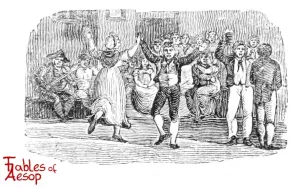

L’Estrange version
A stag that was close pursu’d by huntsmen, fled for safety into a lyons den; and as he was just expiring under the paw of the lyon: Miserable creature that I am, says he, to fly for protection from men, to the most unmerciful of beasts!
Moral
There are harder and gentler wayes, even of ruine it selfe; as ’tis common we see for men under a capital sentence to petition even for the change of the death.

Crane Poetry Visual
[Note: This version is slightly different in that the deer doesn’t know the lion is there but similar enough to add here.]
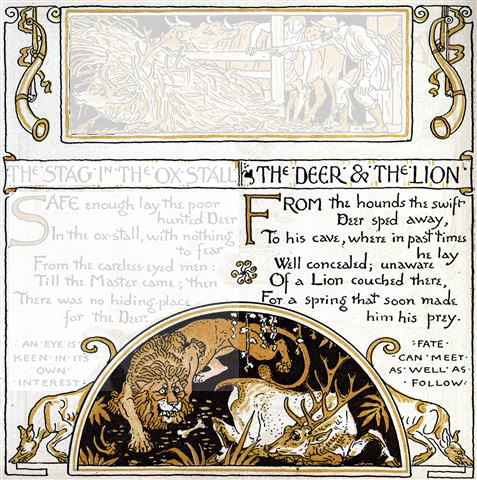
From the hounds the swift
Deer sped away,
To his cave, where in past time he lay
Well concealed; unaware
Of a Lion couched there,
For a spring that soon made him his prey.
Fate can meet as well as follow.

Gherardo Image from 1480

Cerva in Speluncam Fugiens
Cerva, venatores fugiens, in speluncam quamdam, ubi leo degebat, pervenit ut in ea nimirum ingressa lateret. Sed illico ab eo comprehensa necique parata, “Ah me infelicem,” exclamavit, “quae fugiens homines, ferae me tradidi!”
Moral
Ita nonnulli hominum, minoribus periculis territi, maiora se in mala coniiciunt.
Perry #076
